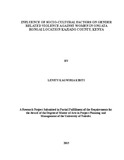| dc.description.abstract | The prevalence of gender violence in Kenya is a major concern. About 36 percent of women who have experienced gender violence, the first experience of violence occurred at age 15-19 as stated by FIDA 2010 Gender Violence Analysis in Kenya. Levels of gender violence were found to be highest in the Kajiado County of Kenya. The purpose of the study was to analyze influence of socio-cultural factors on gender related violence against women in OngataRongai Location in Kajiado County, Kenya. The study was guided by specific objectives namely; to determine whether property ownership influence gender related violence, to find out whether domestic chores influence gender related violence; to examine whether community socialization influence gender related violence and to find out whether decision making influence gender related violence against women in Ongata Rongai Location in Kajiado County. The research was inclined to the Johan Galtung‟s Theory. Descriptive research design was adopted for the study. Systemic sampling was used to select respondents. The researcher used questionnaires to respondents as well as interviews as research instruments. Krejcie and Morgan table was used to select a sample of 375 respondents from a universe of 15000 population. Stratified sampling was used to select 12 administrators which is equivalent to 30% of 40 administrators. The researcher used questionnaires for household respondents and interview schedule for administrators as research instruments. Descriptive statistics was used to analyze data by use of frequencies and percentages. Statistical Package for Social Sciences (SPSS) was used as a tool to aid the analysis. The findings of this study were: there is a significant relationship between property ownership and gender related violence against women where 69 per cent of the respondents agreed to the statement. Majority of property ownership was placed on the men compared to women. Also there was a significant relationship between domestic chores and gender related violence against women. This was verified by 28 per cent of the respondents. Women were considered more in domestic chores than men. The study revealed that there is a significant relationship between community socialization and gender related violence against women. 16 per cent of the respondents agreed to a great extent while 58 per cent agreed to a small extent. It was finally established that there was a significant relationship between decision making and gender related violence against women in OngataRongai Location Kajiado County. This was verified by 54 per cent of the respondents agreeing that decision making influenced gender related violence. The administrators played a great role in sensitizing the community about gender violence and enforced laws. This study recommends that the Government embraces affirmative action in its institutions as well as ensure that there are gender violence policies which are implemented. More NGOs should also be encouraged to sensitize communities about gender violence, its implications as well as laid down laws on the same. Further research should be conducted to establish the impact of gender related violence on women. A research should also be undertaken to towards successful implementation of gender violence policies. | |

